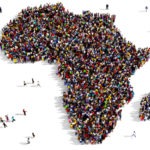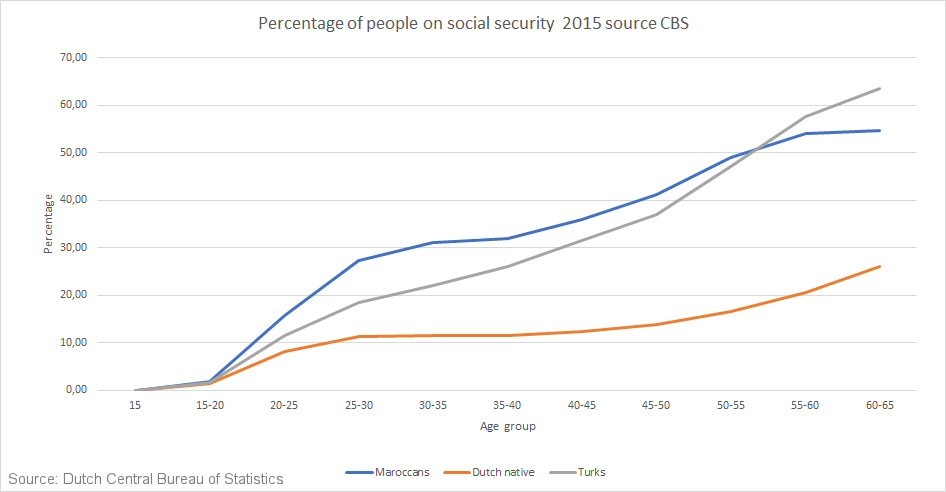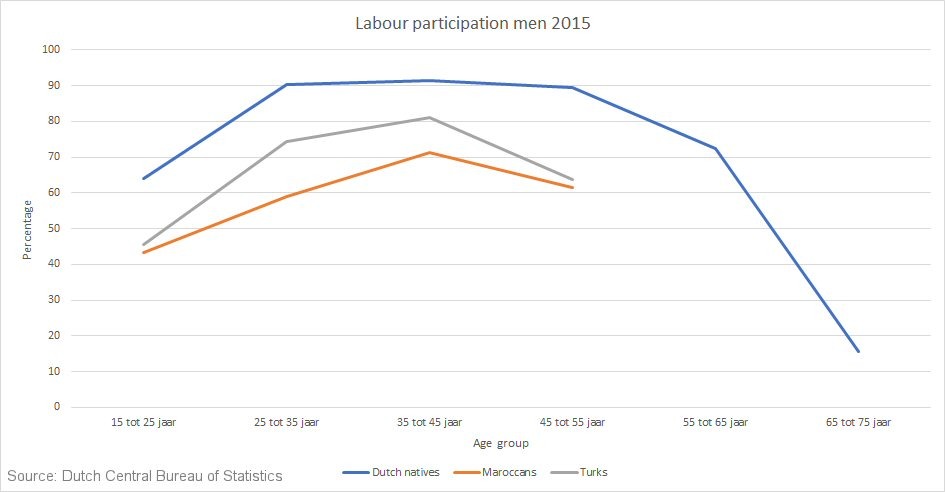The Economist ran a couple of articles promoting migration as good for the global economy. Professor Bryan Caplan argued that labour is the world’s most valuable commodity and its value depends on location. If borders were open, a world of free movement would be $78 trillion richer1)If borders were open A world of free movement would be $78 trillion richer, The Economist 2017-07-13. Mexican labourers can expect to earn 150% more in the West. Unskilled Nigerians make even 1,000% more in Germany than in Africa. The value of an unskilled worker is so much higher in Europe that a Nigerian can make 10 times as much in Germany, adding 1000 times more to global GDP. Because Western societies are more structured and organised than the Mexican or Nigerian, the unskilled worker can be more productive in a factory in Germany or a farm in the USA than in Africa. A taxi ride in Berlin is much more expensive and thus valued much higher than a taxi ride in Lagos, while the amount of work, driving a car for a while, is the same.
If The Economist expounds Professor Bryan Caplan’s view correctly, then the argument is plain idiotic. The Economist confuses countries with companies that are profit-oriented, and where people are disposable resources. Yet, countries are communities, and citizens do not usually expect their governments to merely maximize GDP. History teaches us that migration causes social unrest, disrupts social cohesion and ultimately the stability of the recipient nation. And even if we set aside these social or national considerations, The Economist‘s reasoning is still false.
The whole argument breaks down on social security and the massive world oversupply of unskilled labour. Social security determines the minimum price of labour. If there is an abundance of unskilled workers, governments step in and buy or take out of the market the oversupply of labourers for a minimum price called social welfare. Thus, social security does not differ from setting a minimum price for milk. The consequence of a minimum milk price is that farmers will produce more milk than can be consumed. The surplus is then bought by the authorities and ultimately destroyed, or a milk production quota is imposed.
Moroccans and Turks in the Netherlands are labour migrants. The Netherlands has no historical relation with either Turkey or Morocco. There is no colonial relationship whatsoever between these two countries and the Netherlands or shared history.
In the most productive group aged 30-35 more than 30% of the Moroccans and 22% of the Turks receive social security benefit, but only 11% native Dutch. The labour participation for Moroccan men aged 25-35 is a shocking 60%, whereas for the native Dutch it is about 90%. In the age group 50-55, nearly 50% of Moroccans and Turks receive social security while only 16% Dutch. Labour migrants are a drain on the indigenous population rather than a relief.
It is clear that the Dutch labour market has a massive oversupply of unskilled third-world workers. Apart from social security, there are also intangible costs such as an increase in crime, and especially terrorism, both related to North African migrants.
Africa has 1.2 billion people that will double in the next 25 years, of which huge numbers are about to join European labour force in the coming decades. At the same time the highly educated and skilled western populations will decline, reducing the demand for unskilled labour even further. There is no chance that Europe can afford to keep its social welfare without enforcing a quota on migrants. And even if social security is dropped altogether, the European labour market will reach a situation where there are so many labourers that they become as worthless as they are in Nigeria. For the unskilled European working class it is tantamount to suicide to vote open borders advocates into office.
Interestingly enough, The Economist implicitly stated that Africans are not able to utilise their labour force themselves. Bringing the African population under European supervision failed during the very brief period of colonisation of Africa, and now The Economist wants to bring the Africans under European supervision by using open borders policy and moving the African population to Europe. Does The Economist really suggest that white Europeans are the only ones who can solve Africa’s problems?
References
| 1. | ↑ | If borders were open A world of free movement would be $78 trillion richer, The Economist 2017-07-13 |







9 comments on “The Economist: sending 1.2 billion unskilled Africans to Europe will increase world GDP”
Bryan Caplan- yet another crackpot Jewish “intellectual”. Every single time.
I suggest that there may be ulterior motives, other than purely financial ones for allowing or creating the influx of Africans into Europe. I suggest that you research the Kalergi plan.
“The Economist: sending 1.2 billion unskilled Africans to Europe will increase world GDP”
This proposal would be analogous to telling Europeans: Amputate your arms and legs because your heart will be less strained and you will live longer — the downside is that you will always need the Government to feed, house, clothe, and protect you.
Instead, perhaps Europeans should end immigration, use military to extricate the current savage immigrants, then send the Africans back to Africa. Better yet, also exile people like Professor Bryan Caplan, to live in Africa.
This is a horrible idea but perfectly in keeping with the Kalergi plan for European genocide…why does the elite hate the European peoples so?
A country is expanding waves of kinship. Finance capital (private bank credit) has done away with Kingdoms, and hence concentrated sovereign power that can resist usury.
Democracies are easy to subvert with money power. For example in U.S., Senators are easily bribed with lobbyist money. Corporations became more sovereign than people with Citizen’s United, and so on.
Elites want to pay off their paymasters, who are the bondholders and owners of the world. Finance capitalism aggregates wealth into a pyramid structure, which is why .01% are taking all of the economic overhead for themselves. Mass third world immigration further values “capital” and devalues labor. Bonds continue to be paid, even at three or four times their face value. The usury on bonds and various other debt instruments continues to elevate parasite class that lives off of the output of others.
In ancient civilizations, these “elites” had to give back. They gave back more easily because their fellows were genetic cousins. Today, parasite elites are often genetic or foreign nationals, who have no connection with their hosts. Immigration is a trifecta for elites. It keeps host population confused, keeps proles from looking at the class warfare, keeps labor costs suppressed, and elevates purchasing power of capital, it keeps people quiescent with heads down, as if afraid to lose their jobs to immigrant invaders, and so on. Anybody with more than two digits to their IQ can see that unrestricted African immigration will destroy Europe, so Economist lies are a function of being paid to lie. Or, economic thinkers of Economist are so brainwashed they really believe their shibboleths. They are high on their own supply. As Michael Hudson says, J is for JUNK economics.
The elites’ relentless imposition of massive immigration of destitute Africans is a means to further undemine nationalism and populism in Europe. While the middle class shrinks and turns to populism and nationalism the destitute immigrants represent an inexhaustible source of cheap manpower always ready to fight in support of the elites’ privileges for the sake of receiving protection and approval. They are the assault troops on the frontline in the war waged by the elites against the European nationalist middle class.
Such an increase in massive african immigration will eventually disrupt social structures and finally backlash on the parasite elites themselves. Digging a grave for themselves: ignorant criminal fools.
“Caplan” probably comes from “kapłan” in Polish. Pls check in other languages: https://pl.wikipedia.org/wiki/Kap%C5%82an
“kapłan” means “priest”. This family name suggests that Bryan comes from Polish Jewry, probably from Jewish nobility, Levis, Cohens, etc. For sure Bryan promotes Jewish agenda.
Err, one only needs to look at who owns “The Economist” to understand the logic behind the article.
“Owner: Cadbury, Rothschild, Schroder and Agnelli families”.
https://en.wikipedia.org/wiki/Economist_Group